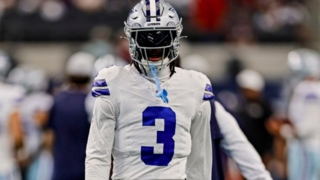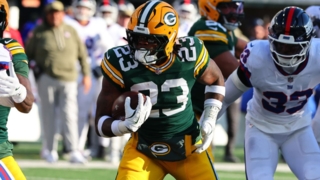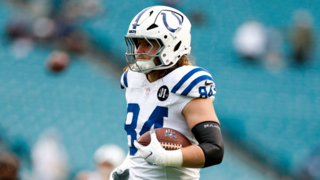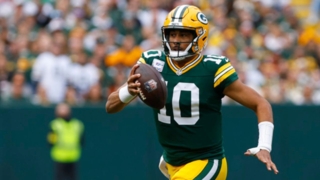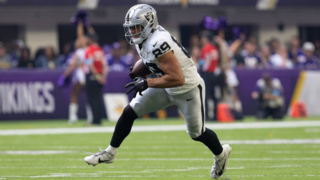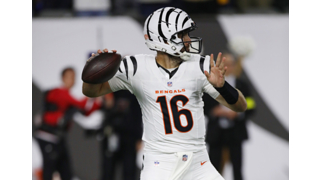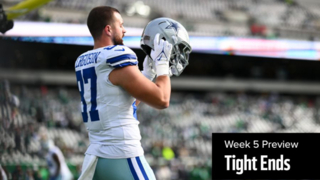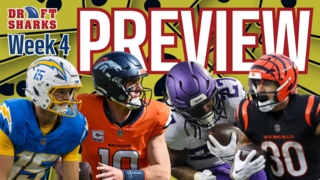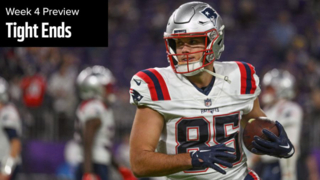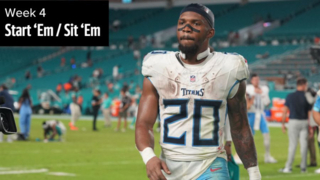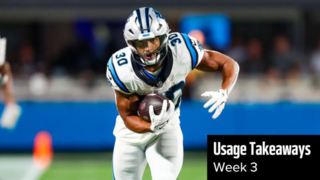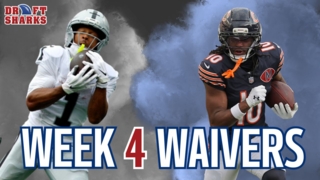Win the TE Battle, Win Your League: How to Exploit the Most Overlooked Position
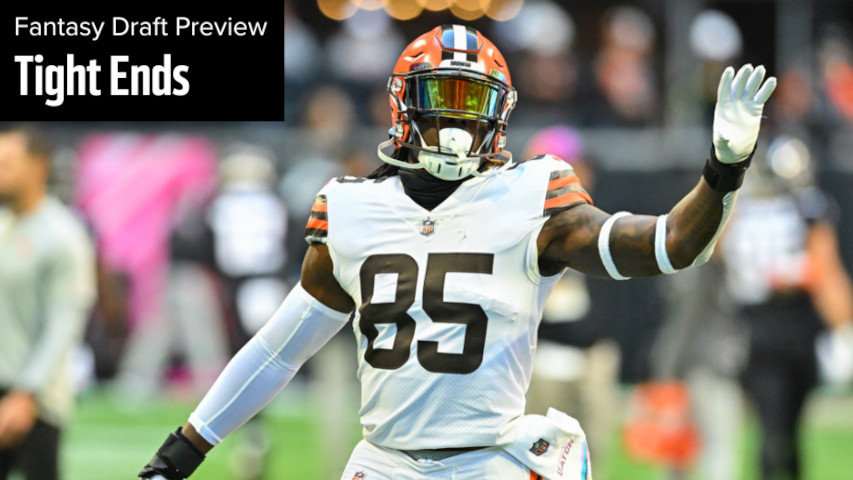
TE Production Falls Off Faster Than You Think
TE remains the shallowest position in fantasy with a distinct advantage to having a top scorer week-to-week.
Check out the averages for the top six TEs over the past two years vs. the next six …
| Points per game | targets per game | receptions per game | Yards Per Game | TDs per game | |
| TEs 1-6 | 13.08 | 7.12 | 5.25 | 56.53 | 0.33 |
| TEs 7-12 | 10.31 | 5.86 | 3.76 | 45.19 | 0.28 |
That difference of nearly 3 PPR points per game would deliver your lineup a strong weekly boost. But, how can we identify the TEs who will emerge as those top-level performers?
Why Targets Remain the Clearest Path to TE Scoring
Over the past three seasons, top-6 TEs averaged 100.32 targets per season with a median of 120.5. The next six TEs averaged 87.28 over the same period with a median of 89.5.
With each NFL team utilizing TEs differently within their system, identifying players who will stay on the field and get schemed open is crucial.
What Do Our Projections Say?
Head over to the TE rankings and you’ll see that we project two TEs to earn 140+ targets apiece:
- Trey McBride (151)
- Brock Bowers (142)
Both McBride and Bowers profile as top options for their teams' passing games with plenty of opportunities for receptions and TDs.
The following TEs are all projected to have 100+ targets
- Travis Kelce (116)
- David Njoku (112)
- T.J. Hockenson (110)
- Jake Ferguson (105)
- George Kittle (104)
- Dalton Kincaid (102)
- Evan Engram (102)
- Sam LaPorta (100)
Unsurprisingly, these constitute 10 of the top 12 TEs in our PPR rankings. Only Mark Andrews and Tucker Kraft are missing from the 100-target list. We currently project each to get 83.3 targets -- but making up for that with 6+ TDs apiece.
Of course, drafting an early TE doesn’t necessarily mean you’re getting a guy who will score that way.
Over the past three seasons, 66% of TEs among the top-12 in PPR ADP finished the year as top-12 at the position.
That leaves an opportunity for TEs drafted outside the top 12 to climb into fantasy-starter territory and deliver you season-altering value.
Questioning When to Take a TE?
Head to the Draft War Room to get a custom made fantasy football cheatsheet specific to your league!
Elite TEs Are Fun … But Are They Worth It?
Investing in a top TE gives you a positional advantage but comes at the cost of passing on a startable RB or WR.
According to current ADP, the TE1 comes off the board around WR11 and RB12. TE9 comes off the board around WR44 and RB35.
Last season, the difference in PPR points per game between TE1 and TE9 was 5.46 points.
The difference between WR11 and WR44 was 5.35 points, while the difference between RB12 and RB35 was 7.35 points.
Going TE very early costs you value at RB, even with the emergence of high-scoring TEs Brock Bowers, George Kittle, and Trey McBride, who all topped 230 points in PPR leagues last year.
This generally aligns with our redraft PPR ADP Market Index. We assess most of the top TEs as appropriately valued, but reaching ahead of ADP for an elite TE doesn’t look like a worthwhile move.
Stay flexible, though. If one of the top TEs falls beyond his ADP, selecting him will cost you less in value lost elsewhere.
We also love the value of most options in the TE12-19 range. Passing on elite TEs gives you the opportunity to scoop up one of these values later.
Adjusting to how your individual league assesses TEs allows you to let the value come to you, giving you the best overall team.
You can always sync your league and use our Draft War Room to gauge how to attack TE as your draft plays out.
The TE Draft Verdict: Win Without Reaching
If a top-5 TE falls past his ADP, consider grabbing him. That gives you the potentially lethal combo of a full-season positional edge with weekly target certainty.
Sam LaPorta might be an exception. Note that although he sits fourth in our TE rankings, he ranks just 10th in our target projections. The upside’s there, but he doesn’t present as sturdy a weekly PPR floor as other TEs around him.
Of course, it’s also OK to wait on TE, regardless of how the rest of your league treats the position. David Njoku and Tyler Warren stand out as high-upside targets around the bottom of TE1 range, for example. They rank ninth and 10th in our ceiling PPR projections for the position. But hitting that ceiling could propel either player into the top 6.
The Numbers Say: Target TEs Earlier in TE Premium
TE-premium describes leagues where TEs get extra scoring bonuses over other positions. The most common example is TEs earning 1.5 points per reception vs. 1 point for all others.
The strategy shifts heavily in this format since the gap between elite TEs and mid-tier TEs widens. Now, TE1 to TE9 is a difference of about 7.6 points per game.
That said, don’t get caught simply reaching for the “next guy” because you’re worried about running out of options. The format makes TEs more important, but it doesn’t transform them into roster dictators who control your success (or failure).
Make sure your TE selection fits the value in your draft and your overall roster construction.
In TE Premium, our ADP Market Index takes the premium into account. We are lower on the two first-round TEs in Bowers and McBride, but the rest of the top crop are undervalued currently in the format.
Undervalued TEs Poised to Beat Their ADP in 2025
Sometimes, taking a shot on a late-round TE pays off handsomely. Like Brock Bowers and Zach Ertz last year, the right sleeper TE becomes an every-week starter.
These guys have a shot to significantly outperform ADP and boost your lineup.
TIP
Identifying late-round stud sleepers is one of the tenets of our redraft strategy.
David Njoku, Cleveland Browns
Injuries ravaged Njoku’s 2024, causing him to miss six games and parts of two others. But, he thrived in the other nine, averaging:
- 9.9 targets
- 6.6 catches
- 49.7 yards
- 0.6 TDs
He ranked sixth in PPR points at the position over that stretch.
Njoku currently sits 10th in ADP despite putting up three straight top-9 PPR seasons. Drafters appear scared off by the Browns’ dreadful QB room: Kenny Pickett, Joe Flacco, and two rookies.
But, the list of Njoku’s QBs over those last three seasons hasn’t been stellar:
- Jacoby Brissett
- Deshaun Watson
- Joe Flacco
- Dorian Thompson-Robinson
- P.J. Walker
- Jameis Winston
Njoku even averaged 18.2 PPR points per game with Flacco in 2023 across six games, so we already know that pair can work if Flacco wins the 2025 job.
Dalton Kincaid, Buffalo Bills
Kincaid had a rough 2024, posting only three top-12 PPR finishes (and just one top-5). He has also scored just 2 TDs in each of his two NFL seasons.
But don’t ignore the former first-round pick's flashes as a rookie. He delivered five straight top-10 PPR finishes and seven total that season.
He also saw a 20.4% target share, earning six targets per game over his first nine last year before spraining his PCL. That target share would have ranked fifth among TEs over the whole season, while the target total would have ranked 12th.
He also played through an early collarbone injury that may have hampered his production.
The Bills did add Joshua Palmer and Elijah Moore, but their core remains similar. So Kincaid -- who already finished second on the team in targets each of the past two years -- should see volume once again. All he needs to do is stay healthy to beat his TE15 ADP.
Chig Okonkwo, Tennessee Titans
Okonkwo failed to impress in his first three seasons, averaging only 1.5 catches per game. But he saw increased usage over his final five full games last season, averaging 5.6 catches in those contests.
At 6’3 and 238 pounds with 4.52 speed, he certainly has the athletic profile to be a useful weapon. And he gets a QB upgrade over at least the past two seasons (Will Levis) after Tennessee drafted Cam Ward first overall.
A weak WR depth chart beyond Calvin Ridley helps Okonkwo’s quest for targets. Tyler Lockett, Van Jefferson, and Day 3 rookies Elic Ayomanor and Chimere Dike aren’t likely to scare defenses or hoard receiving volume.
If fourth-round rookie TE Gunnar Helm doesn’t cut into Okonkwo’s playing time, there’s room for the incumbent to score even better than he did over last season’s finish.
Okonkwo turns 26 in September, hitting peak age for TEs based on our aging curve. That means a TE's 26-year-old season is most likely for a player to hit their career high in fantasy points.
The upside makes Okonkwo a worthwhile end-of-the-roster stash.
Crush Your League with this Draft Tool
Drafting the right TE is crucial to winning your fantasy league. But how can you do that?
Utilize our dynamic Draft War Room, where you'll get custom player values for your specific fantasy league and scoring.
Learn More About The Powerful Draft War Room
Draft using the best dynamic tool in the industry. Our fantasy player valuations (3D Values) change during your draft in response to...
- Exact league settings - direct sync
- Opponent and Team Needs
- Positional scarcity & available players
- Ceiling, injury risk, ADP, and more!
You need a dynamic cheat sheet that easily live-syncs with your draft board and adapts throughout your draft using 17 crucial indicators.
Get your Draft War Room Today
 Redraft
Redraft Dynasty
Dynasty Best Ball
Best Ball
